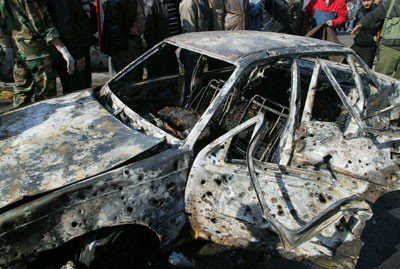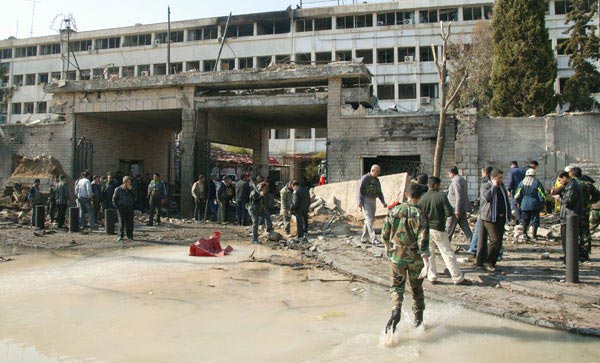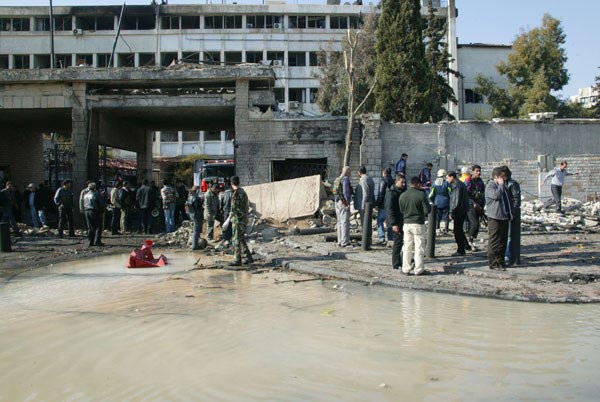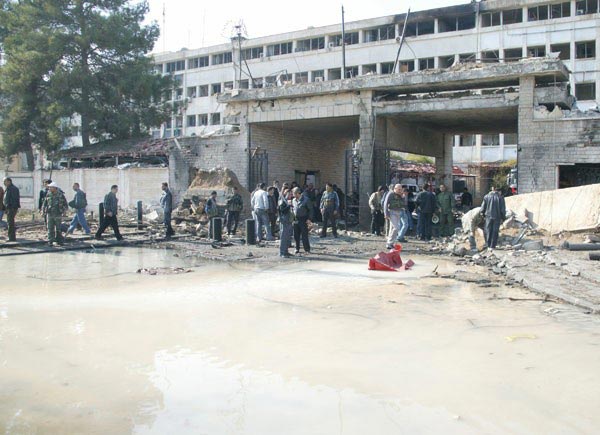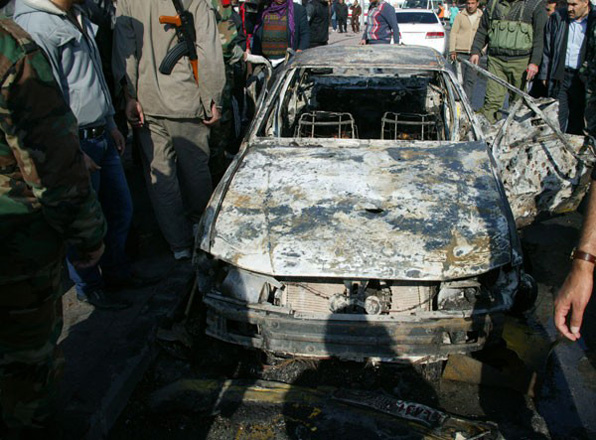Syrian state TV says two suicide car bombs have exploded in the capital Damascus, ahead of calls by anti-government activists for fresh protests across the country Al Jazeera reported
The report on Friday said investigations indicated that an al-Qaeda armed group may have been responsible for the attack, which it said targeted the general intelligence building and a security branch building in the Kfar Sousa district.
The report added that there were several civilian and military casualties in the blasts.
Syrian Television aired footage of dead bodies being transferred to ambulances and of damaged buildings.
Syria has portrayed the nine-month uprising in the country as the work of terrorist extremists and armed gangs.
'Protocol of death'
The attack came a day after the first wave of an Arab League monitoring mission arrived in Damascus to check on Syria's progress in implementing a peace plan to halt the months of unrest.
Using the slogan "Protocol of death, a licence to kill", activists called on Facebook for nationwide protests against the Arab League mission after midday prayers on Friday.
Opposition leaders have charged that Syria's agreement to the mission was a mere "ploy" to head off a threat by the Arab League to go to the UN Security Council.
"We call on the Arab League to refer the matter of the crisis in Syria to the UN Security Council," Omar Edelbi, a spokesman for the Local Co-ordination Committees activist network, said.
He called the observer mission "another attempt by the regime to bypass the Arab initiative and empty it of its contents".
Even as the advance team arrived there was no let-up in the killing, with activists reporting at least 21 more people dead, and clashes between defectors and troops in the flashpoint cities of Homs and Idlib.
The observer mission is part of an Arab plan endorsed by Syria on November 2 that also calls for the withdrawal of the military from towns and residential districts, a halt to the violence and the release of detainees.
The advance team consists of a dozen security, legal and administrative staff from the Arab League's secretariat who will make the logistical preparations for the arrival on Sunday.
Between 30 to 50 officials were expected to be part of the first mission, which is headed by Samir Saif al-Yazal, one of the Arab League's assistant secretary-generals.
Once all the officials arrive, they will indicate cities they will be visiting in accordance with the peace plan.
Nabil el-Araby, the Arab League chief, has stated that protecting members of this mission is the Syrian government's responsibility.
'Hot zones'
The Arab League mission's leader, veteran Sudanese military intelligence officer General Mohammed Ahmed Mustafa al-Dabi, said its numbers would swell to a total of between 150 and 200 in the following days.
Their task will be to monitor the "cessation of violence on all sides, and to ensure the release of detainees arrested in connection with the current crisis," according to the text of the protocol.
The Enough Project, a non-governmental organisation, on Thursday condemned the fact that the mission is headed by a general it said was in charge of the Sudanese intelligence agency when "genocide" was committed in Darfur.
Walid Muallem, Syria's foreign minister, has said he expects the observers to vindicate Damascus's claims that the unrest has been caused by "armed terrorist groups", not peaceful protesters as maintained by Western governments and human rights watchdogs.
Muallem has said the observers will be able to access so-called "hot zones" but not sensitive military sites. Human Rights Watch called on Damascus to grant full access.
Violence continues
In the run-up to the advance team's arrival, however, the Syrian National Council, Syria's main opposition bloc, said on Wednesday that government forces had killed 250 people in 48 hours.
A day later, Syria's state news agency said on Thursday that more than 2,000 members of the security forces had been killed since anti-government protests erupted in March.
The UN, however, estimates that more than 5,000 people have been killed in the government's crackdown since mid-March.
As violence continued across the country, the UN Security Council remained deadlocked over a resolution to condemn the violence in Syria.
In New York, France said "significant progress" had been made at a UN Security Council meeting on Syria.
There were tensions at the meeting, however, with Russia renewing demands for an inquiry into NATO air strikes in Libya in a move US ambassador Susan Rice called "a cheap stunt" to divert attention from the Syria crisis.
Russia and China have already vetoed one resolution proposed by European countries condemning Syria.
Russia, which accuses the West of seeking "regime change" in Syria, last week proposed a new text, which the European countries say is not tough enough on Bashar al-Assad, the Syrian president.

